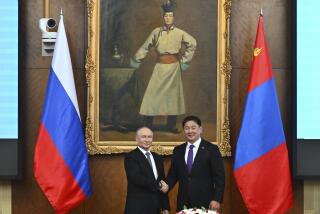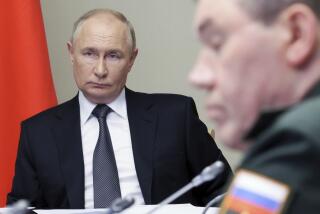Gorbachev Asks Media for Help Against Travel Ban
MOSCOW — Transformed by a court-ordered travel ban into Russia’s “first political refusenik,” former Soviet leader Mikhail S. Gorbachev appealed to the media Saturday to help him force authorities to prove they are acting lawfully.
But press releases from the Gorbachev Foundation, a think tank headed by Gorbachev, indicated that he will bow to the will of the Constitutional Court and not try to leave the country. The court had asked Russian authorities to prevent him from going abroad.
Gorbachev, who was supposed to begin a visit to South Korea on Tuesday, has informed the Koreans that the trip must be put off, a release from the Moscow-based foundation said.
Russia’s foreign and security ministries agreed Friday to restrict Gorbachev’s travel until he obeys a summons to testify before the Constitutional Court in its investigation of the deeds of the Soviet Communist Party, which Gorbachev headed in 1985-91.
Details of the restrictions were not made public, but one Foreign Ministry aide said that Gorbachev’s passport has been impounded.
In a signed appeal to Russian newspapers and broadcast media, Gorbachev said Saturday that he had asked the court and ministries, obviously to no effect, to inform him of all “concrete measures” taken against him, as well as of the texts of the laws permitting such measures.
Taking a jab at the administration of his bitter political rival, Russian President Boris N. Yeltsin, Gorbachev said he was obliged to call on the media because Russia has no law guaranteeing a citizen’s right to information.
He said nothing about any possibility that he might change his mind and agree to testify.
The court ruled Thursday that Gorbachev must obey its summons, just like any other citizen.
Gorbachev, though, contends that the proceedings amount to a “kangaroo court” where both Communists and Yeltsin’s allies want only to use him as a scapegoat for Russia’s current problems.
In its statement, the Gorbachev Foundation suggested that the incident may mark the rebirth of the technique widely used in the old Soviet Union of denying civil rights to political dissenters--a practice that Gorbachev ended during his years in power.
“Evidently it is no accident that the first victim of this outrage is the man thanks to whom the phrase ‘human rights’ is no longer written in quotation marks in our country,” the foundation said. “The first president of the U.S.S.R. has been made into Russia’s first political refusenik.”
More to Read
Sign up for Essential California
The most important California stories and recommendations in your inbox every morning.
You may occasionally receive promotional content from the Los Angeles Times.










